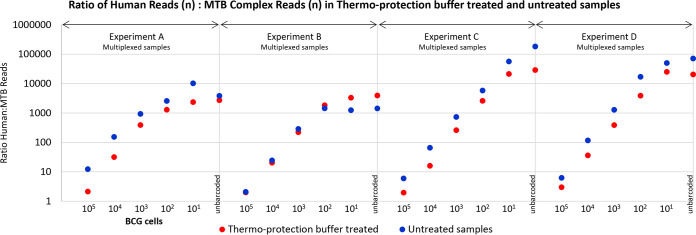FIG 4.
Mock clinical samples were enriched for mycobacteria DNA after heating in thermo-protection buffer. Data are shown for four replicate experiments, A to D, in which samples were barcoded and run multiplexed six per flow cell. Each experiment comprised samples made from a batch of infection-negative sputum (liquefied using thermo-protection buffer containing DTT), 1-ml aliquots of which were spiked with enumerated BCG cells at 105 to 101 cells and zero BCG cells (control). Sputum batch and, therefore, “background” DNA did not vary within replicates A to D, only between them. The full set of replicates was set up twice with heating (99°C, 30 min) and without heating. After sequencing, the numbers of BCG and human-derived reads were assessed and their ratio in each sample calculated. Higher ratios of human-to-M. tuberculosis (MTB) reads were obtained for samples that were not heated in thermo-protection buffer, indicating heated samples were enriched for M. tuberculosis reads relative to human reads, i.e., human DNA was depleted. The exception to this was experiment B, which yielded anomalous results because the number of reads for the unheated sample was unusually poor.

